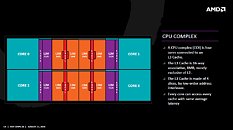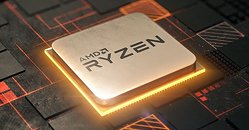Wednesday, July 25th 2018

Rumor: AMD's Zen 2, 7 nm Chips to Feature 10-15% IPC Uplift, Revised 8-core per CCX Design
A post via Chiphell makes some substantial claims on AMD's upcoming Zen 2 microarchitecture, built on the 7 nm process. AMD has definitely won the core-count war once again (albeit with a much more decisive blow to Intel's dominance than with Bulldozer), but the IPC battle has been an uphill one against Intel's slow, but sure, improvement in that area over the years. AMD did say, at the time they introduced the Zen architecture, that they had a solid understanding on Zen's choke points and its improveable bits and pieces - and took it to heart to deliver just that.A 10 to 15% improvement should bring AMD close to Intel's Kaby Lake solutions in pure per-core, single-thread performance - with the possibility for higher performance in multithreaded workloads even at the same clocks and core counts, since AMD's SMT implementation and per-core communication seems to best that of even Intel's Coffee Lake chips. Add to that the sure clock increases AMD will bring to their Zen 2 parts - you can bet the power consumption and top frequency benefits for the 7 nm manufacturing process (some estimated 1.6X logic density, ~20% speed improvement, and ~40% power reduction compared to TSMC's 10 nm process) won't go to waste when they can be used for an even greater performance uplift.Add to that the possibility -also posted via the Chiphell thread) of a per-CCX core-count increase of 8 cores per CCX (with 16-core parts being available for the consumer products) and a purely hypothetical claim for the performance crown now seems not only plausible, but likely.
Sources:
Chiphell, TSMC


108 Comments on Rumor: AMD's Zen 2, 7 nm Chips to Feature 10-15% IPC Uplift, Revised 8-core per CCX Design
Very Imp to Remember how AMD in the Last FX era being criticized for ipc thing and .....Reviewers tends to always downclock FX8350 to match the 6700k for so called fairplay
they dont seems to be doing the same thing now to INTEL where they downclock 8700K to 2700K levels and compare.
they always have two choices either clock it higher or Call it an IPC Gain.....Thats the TRUTH
I ask because i dunno if other factors come in to play when comparing IPC. For example: we know that Zen architecture has lower infinity fabric latency when OCed and that also raises it's performance so, following this logic, there will be significant differences (much higher then margin of error) when you compare a Zen chip with whatever other chip @ X speed VS @ X+500MHz speed.
With such a substantial difference in speed between the tests, how much of a difference in IPC would they have? This could potentially invalidate the way we currently measure IPC between chip architectures.
but they have to compensate somewhere otw it wont fit.
just because your vega 56 OC runs on a 450 watt PSU doesnt mean it isnt drawing more power then the 1080, if fact it is a guarantee it is pulling more unless you got a golden die. Lets see your system power consumption under full load OCed with a kill-a-watt meter, then compare to the same system with a 1080. I'll bet good money the 1080 system will pull noticeably less power then an OCed vega 56.
Vega was slower and more power hungry, thus hotter, then geforce cards were, came over a year after the 1080 came out, and were more expensive. A vega 56 still costs 1080 money. The RX 580 and 480 offered 0 upgrade path for many, being as fast as a 290x, which had been out for several years by that point and had been available for ~$250 at one point after the first mining craze. AMD dropped the ball, hard, and has yet to pick it back up in the GPU space.